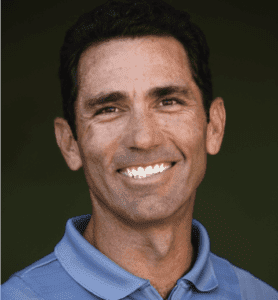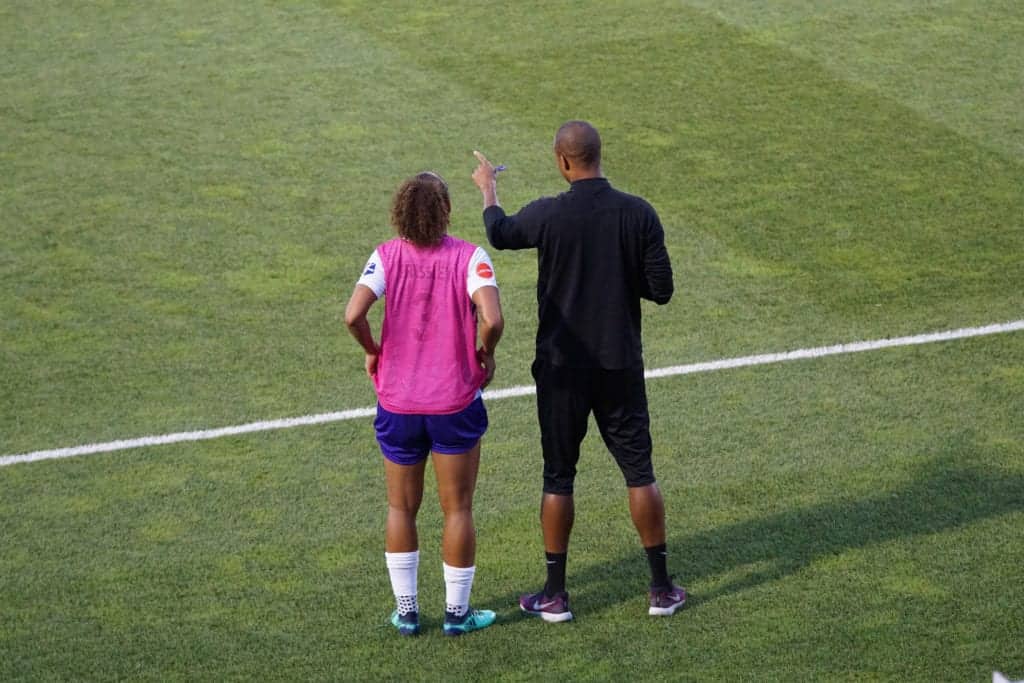When we interviewed Jeff Troesch for our recent article “Inside Improvements: Insights from Three Decades of Mental Performance Coaching” there were just too many valuable insights to squeeze into just one article. So, we felt we just had to share the extended Q&A here.
A theme I’ve picked up on is that you’ve moved your clients to be proactive about their mental preparation and results rather than reactive (i.e. crisis management), can you share more about your approach?
“I have always been a strong advocate of the notion that you ‘don’t have to be sick to get better’ and a proponent of a wellness model for skill development. Early exposure to an array of tools and skills can often equip an athlete or a coach with requisite remediations for commonly occurring issues in sport. The sooner a client is aware of how to identify possible mental/emotional challenges in her sport, and the stronger the habit formation of helpful strategies, the better. This generally takes a fair amount of time and practice, and the skill acquisition is frequently enhanced when an athlete learns this prior to being in “crisis” mode.”

What title do you like to use?
“I have been doing this for 32 years and still haven’t decided upon a title I like! I most often go with Performance Consultant, Mental Coach, Mental Trainer, or Sport Psychology Consultant.”
When you work with clients, can you describe the consultation process or processes?
“There honestly isn’t a ‘typical’ as I get referrals from a multitude of sports, with athletes at all levels and referred to me via a wide array of avenues. Probably most generally true is that I meet with the athlete, go through some sort of assessment process to help me get a sense of background information and perceived need, and then collaborate with the client to formulate a plan of action. This action plan often begins with an education process wherein I expose the client to the fundamental models from which I work and from which my philosophy is drawn. After that, it is often an on-going regimen of conversations, training and/or competition observations, and providing homework/recommendations for growth and development.”
What do athletes commonly seek your help with?
“Among the most common are: competitive anxiety, confidence challenges, focus issues, difficulty in managing expectations or failures, inconsistency in performance, struggles with taking practice/training successes into the competitive arena, communication with members of their staff/team/entourage.”
What is your guiding philosophy? Describe how athletes use your philosophy and how this is different to the way they approached things before?
“I have a few foundational philosophies, and wouldn’t honestly say that one and only one is my ‘guiding’ philosophy. One of my primary philosophies is to be transparent and authentic with my clients. It does not serve them well for me to tell them what I think they want to hear or what I think will make it easy or gentle on them. I feel like I honor my clients if I give them an honest mirror into which they can reflect.
Additionally, I believe strongly that we make a choice as to what we think and that building strong habits of awareness and discipline regarding thought is necessary- necessary but not sufficient. I believe that alongside this is a necessity to put emphasis on action- as great thoughts without attendant action is nearly worthless in competitive athletics.
I also work to help every athlete reframe their experience so that their emphasis is on a primary goal of ‘get one day better every day’, and that there is daily clarity on what that ‘one day better’ actually was today. This daily accumulation of improvement increases the likelihood of the ultimate outcome goals. However, emphases on those outcome goals often distract or emotionally paralyze athletes and coaches. How this is different for athletes is that they become more disciplined with their thoughts, more accountable for their actions, and more realistic and focused on the daily tasks. This in turn often decreases anxiety, improves focus and intention, and translates into a more enjoyable experience toward mastery of their craft.”
Anxiety is common source of underperformance in the broader population globally, student population and in elite athletes. How do you manage anxiety in relation to performance and results?
“The answer to this varies widely depending on what the genesis and etiology of the anxiety. Mindfulness training (relaxation, meditation, deep breathing, prayer, etc.) is one of the tangible modalities that I recommend. However, my experience has been that much of anxiety is triggered by thoughts that are non-productive and are perpetuated by habits which are unhelpful or unhealthy. Helping athletes explore the foundation of their anxiety and helping them gain awareness about how they are complicit in perpetuating their anxiety is a significant part of my journey alongside many of them. Then it is about assisting in the creation and utilization of more healthy habits of thought and action.”
What gets you excited / what do you look forward to most about your role as a consultant/sport psychologist/sport counselor?
“I get excited about watching people grow. It has been a humbling and rewarding experience to be alongside literally thousands of athletes and coaches over three decades and being witness to the transformations that take place in people’s lives and sport experiences as they make improvements and put additional tools in their metaphorical toolboxes. Being along for the ride and observing the positive impact on sport performance and personal/professional relationships has been a joy and a blessing.”
What have been the top 3 things that have helped you succeed in your work with clients?
- Being Authentic
- Being very focused and present with the person right in front of me and working to have them feel the reality of how much I truly care.
- Being adaptable and flexible- learning from each and every client with whom I’ve ever consulted and being willing to use that accumulated knowledge to enhance my effectiveness
What feedback do you receive from your clients about the best thing about working with you?
“I hear often that I seem like an athlete or coach who can relate to their sport experience and that I speak the language that helps them apply the sometimes-nebulous principles of sport psychology. Basically, I hear that I am a jock who knows mental training, instead of a psychologist trying to speak the language of sport. Another thing I hear is how grateful my clients are that I have had so many successes with high-level athletes and that I’m willing to use my accumulated knowledge and share how to assist them on their own journey toward excellence.”
Where is your main focus today and what parts of your work are you focusing on in the future?
“My main focus today is working with Division 1 NCAA programs and athletes and assisting them in building strategies for peak performance. Building cultures, enhancing team cohesion, improving efficiencies and effectiveness to progress toward their goals. My future work is going to involve more ‘train the trainer’ as I consult more frequently with coaches who benefit from my exposure to so many great coaches and successful teams. I also intend to utilize the DISC Profiles much more in the future as I’ve seen the immediate impact with nearly all of the clients with whom I’ve used the Profile.”
Is there an example of your work with a client or clients that stands out for you? That highlights the great work that you do? (you can leave out names to keep confidentiality)
“I have had a multitude of athletes that have risen to #1 in the world in their respective sports, won Gold Medals at Olympic Games and World Championships, won National Championships and broken world records. However, what highlights the work that I do is a drawer in my home that is filled with letters, cards, and emails from athletes, coaches, and family members of athletes or coaches who have written to thank me for the impact I’ve had in their lives. Besides my daughter’s photos and my marriage certificate, these are my most precious possessions.”
What is most misunderstood about the work you do with athletes, coaches and/or administrators?
“Most misunderstood is that I work in a clinical setting on mental illness and/or that the athlete only benefits when she has a ‘problem’. Those that understand know that being proactive and skill building and doing wellness education is how I can make my most significant impact.”
If you were to give one piece of advice to a coach or athlete, what would it be?
“Learn to be honest with yourself as you formulate a plan that resonates with your true ‘why’. Then be willing to do the hard work through disciplined thoughts and actions to give yourself the best chance to manifest your own destiny and potential.”
What you are most proud of? What has been your career highlight so far?
“I am most proud of the mental trainers and coaches around the world who are utilizing the philosophies that I helped them formulate to positively impact athletes and sports organizations. My career highlight is the first time one of my tennis players achieved reaching #1 in the world.”
What was one thing you changed from last year that has made a significant difference?
“Being certified and utilizing the DISC profile.”
What advice would you give someone starting out in their career as a consultant or sport psychologist?
“There is no shortcut to being successful. Be ready to work your tail off and be humble enough to be grateful to work with any athlete or coach willing to work with you. Make sure you’re clear about the limits of your knowledge and your expertise. Work in a collaborative manner with coaches and athletes. Get as much hands-on experience as you possibly can. What you learned in school is helpful, but what you learn actually doing the work is what will make you successful.”
How/why did you get into what you are doing now?
“There are a multitude of reasons why I’m into this. From the time I was as young as 12-years-old I was an athlete who had coaches encourage me to assist in building the culture and ‘vibe’ of teams that I was on. I was in the front office of a professional sports franchise at 21 years old and saw the dire need for athletes to have someone safe to talk to and lean on. This was at a time when there were probably less than 50 mental trainers in the U.S. I just saw this avenue as a way to keep me in athletics and also to have a meaningful job experience.”
Can you share an ‘ah-ha’ moment in your career?
“One of my aha moments came early in my career when I was attempting to dissuade a high-profile client from continuing behavior that was illegal, counter to a healthy athlete lifestyle, and was a threat to his well-being and longevity. When I (with the athlete’s permission) discussed this with his coach and his agent, they both worked to squelch my recommendations and suggestions- because they were concerned it would cost them some money and a chance at professional fame. I naively assumed when I was young that the ‘team’ around an athlete always had the athlete’s best interest in mind.”
How has working with Athlete Assessments contributed to your work with clients? (what has been most valuable)
“Working with Athlete Assessments’ DISC profiles have contributed in that they have expedited the self-awareness process for clients and allowed our discussions to be richer and deeper much more quickly. The insight gleaned has assisted the athletes and coaches to recognize their behavioral tendencies and to have a plan of action to make beneficial adjustments. It has also significantly enhanced the quality of discussions regarding relationships and interactions between and among players and coaches.”
Any other comments about the work we’ve done with you or about us?
“The quality of interaction, the service-first approach, and the genuine caring of the staff of Athlete Assessments has been exemplary.”
Tell us about the work that Tim Bayley is doing with you?
“Tim Bayley is a former high-level international athlete, and professional and collegiate coach. Tim is a certified DISC consultant and recent recipient of a Master’s Degree in Sport Psychology. I have been mentoring Tim to translate his personal experience and his deep caring of people and sport to assist teams, coaches, athletes, and athletic organizations to prepare and perform optimally.”
Recommended Articles
Every time an athlete, coach or team strives to better their performance, they analyze themselves in action, identify areas to improve upon and make plans for change...
Get one day better every day. Have clarity on what that 'one day better' actually is each day. The daily accumulation of improvement increases the likelihood that you’ll reach your goals...




